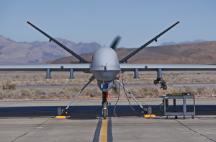WASHINGTON -- The U.S. Air Force is in trouble. The rising cost of high-tech jets and the people to fly and maintain them threatens to put the service "out of business," in the words of Air Force Secretary Michael Wynne. He said last fall that he was worried the military couldn't buy enough planes, fast enough, to replace 30-year-old F-15s and 50-year-old tankers before they started falling out of the sky. Wynne's statement proved eerily prescient: In November an Air Guard F-15 manufactured in 1980 disintegrated in mid-air, nearly killing the pilot and resulting in a prolonged grounding for most of the fleet. Air Force aircraft are now 24 years old on average, compared to just eight years old in 1967, and under current plans that figure will, at best, hold steady. Operating this geriatric fleet represents an "era of uncertainty," Maj. Gen. Paul Selva, the Air Force's director of strategic planning, told the Associated Press. But there is one bright spot. The last decade has seen rapid development in Unmanned Aerial Vehicles that, owing to the absence of life support systems, are considerably cheaper than manned warplanes -- and, in many ways, just as capable, if not more so. Is the latest generation of UAVs and armed Unmanned Combat Air Vehicles (UCAVs) a solution to the Air Force's problems?
Are Unmanned Airplanes the U.S. Air Force’s Salvation?

